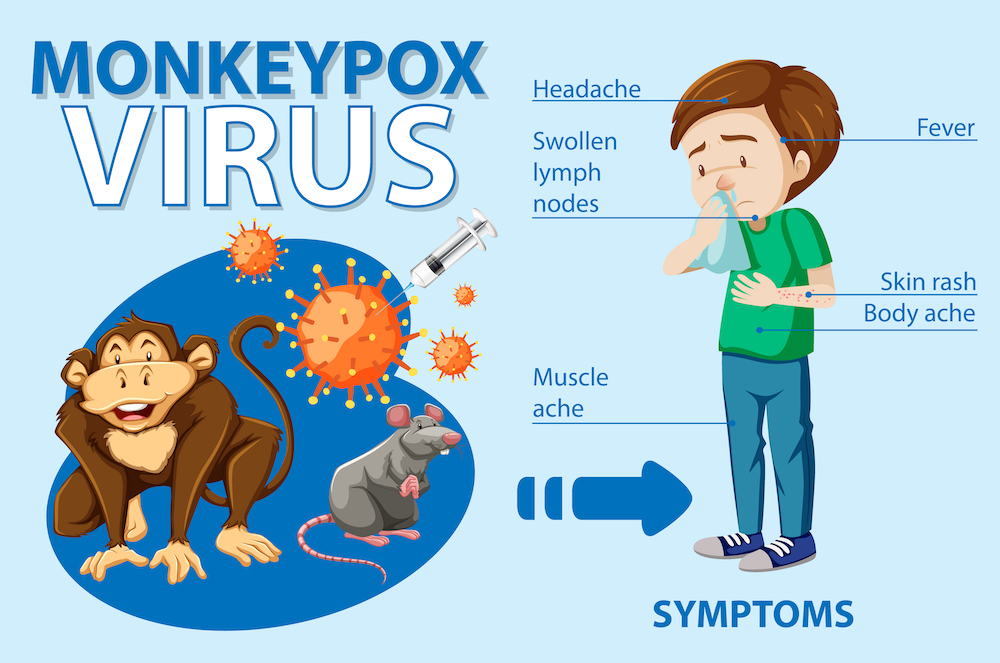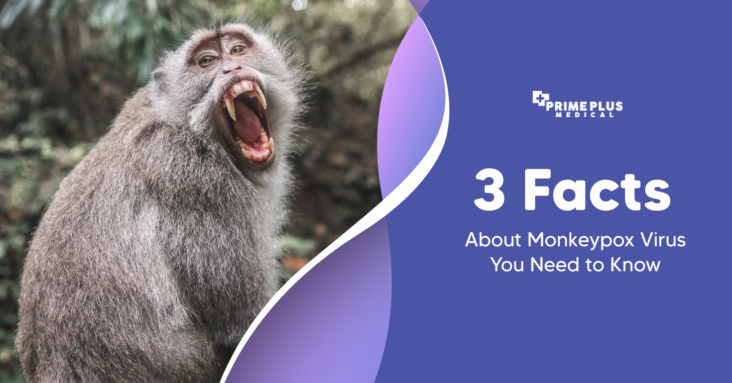It all began in late April 2022. An individual from United Kingdom travelled to Nigeria, just minding their own business there, until he eventually had to return home. However, few days before he prepared to return from Nigeria to go back to the UK, this individual developed a rash on 29 April 2022.
They thought nothing of it in the beginning and continued on with their plan to depart from Nigeria on 3 May to arrive in the UK on 4 May 2022. But then the rash got worse.
The individual looked for medical attention and was then immediately isolated. They were suspected of being infected with a disease known to commonly spread in Central and West Africa, the Monkeypox. Unfortunately for them, that suspicion was later confirmed to be true on 6 May 2022 and subsequently the World Health Organization (WHO) was informed the day after on the matter.
It has been more than a month since this monkeypox case was detected and things are seeming growing worse. Reuters reported that more than 1000 monkeypox cases were reported to the WHO by 8 June 2022 from 29 countries outside of Africa where the disease is endemic.
With the spread of this virus alerting many countries around the world, Prime Plus Medical is here to share 3 facts that you should know about the monkeypox virus.
 What is monkeypox virus? Image source freepik.com
What is monkeypox virus? Image source freepik.com
1. Monkeypox Are Different
First thing first, know that there are two types of viral monkeypox.
One of them is the milder monkeypox virus variant common in West Africa. This particular monkeypox virus is the same monkeypox as in the case on 6 May 2022 in the UK.
West African monkeypox are known to be tamer than the other type because the disease is usually self-limiting and only lead to severe illness at most rather than death. In fact, WHO estimates that there is only a 1% fatality rate for monkeypox case of this variant.
In contrast, the Congo Basin or Central African variant of the monkeypox virus is 10 times more deadly. Fatality rate may even go as high as 10% for individual who contracted this disease.
Despite all this, both monkeypoxes share many similarities in terms of its incubation period, symptoms, origin, and how they spread.
Centers for Disease Control and Prevention (CDC) explained that the typical incubation period for monkeypox is about 1-2 weeks, but cases show that the period might even range between 5-21 days.
Then, first signs of symptoms usually begin with some headaches, fevers, body aches, swollen lymph nodes, chills and exhaustion. After that, up to around 3 days after the patient caught a fever, rashes would appear.
Lesions would then develop in these orders before falling off:
- Macules, or distinct and flat discolorations of the skin;
- Papules, or raised skin area on the macules;
- Vesicles, or the blistering of the skins where these papules produce small sacs of clear fluids;
- Pustules, or the bulging patch of the skins where these vesicles would redden and the fluid turned into yellowish pus; and finally
- Scabs, or the covering of your skin with protective layer after the damages it has sustained due to the previous lesions.
This whole process may take between 14-28 days and it is a very precarious situation because during that time the patient would need to endure incredible and painful itchiness. It is important not to scratch these lesions, especially with dirty fingers, since it could lead to bleeding and infections.
2. Monkeypox Are Not Really Spread By Monkeys
You may not believe this, but the monkeypox virus are not exactly spread by monkeys. According to WHO, this virus spread to humans mostly through various African rodents like squirrels, rats, and mice.
The UK National Health Service (NHS) reports that humans could contract monkeypox from infected animals through bites, scratches, or contact to their infected substances. Consuming infected meat and direct contact with products made of these infected animals like skins or fur may also cause the infection.
However, the spread of the disease from Africa abroad seem mostly occuring because of human-to-human transmission. This means the spread of monkeypox disease to countries outside of Africa is mostly suspected to happen because of human travelers who got infected by the virus.
There are several ways of how monkeypox virus can spread from one human to another. For the most part they are very similar to how it spread to humans from animals in the first place. Which is through direct contact with the infected human’s bodily fluid, skin, or items that they have been in contact with.
Here is a list of things that you could do to avoid contracting the diseases from human-to-human transmission:
- Avoid any coughs or sneezed, sweat, or any bodily fluid from a person with monkeypox rash;
- Avoid direct skin-to-skin contact with the infected patient’s skin blisters or scabs; and
- Avoid being in contact with bedding or towels or any other items that may have been in contact with monkeypox.
- Maintaining your hygiene by wearing masks and gloves or washing your hands and taking baths, especially if you have been in contact with or were inside an enclosed room with a monkeypox patient.
Much like patients of COVID-19, one of the ways for patients of monkeypox to prevent further spread is by isolating or quarantining themselves from being in contact with other people. Ideally, patients should also seek medical attention through remote means such as Home Visit Medical Services from clinics or hospitals.
3. Monkeypox Is Preventable
While the recent monkeypox outbreak is certainly alerting, two things must be underlined about human monkeypox disease.
Firstly, monkeypox virus infection outside of Africa is incredibly rare. This is because the only way for you to be infected is by being in contact with infected animals from or with an infected person who have travelled to central or west Africa. Secondly, monkeypox is not even a new disease. Earliest cases of monkeypox dates back all the way to Congo during the 1970s.
These facts mean that this disease has been adequate studied. Today, we know several methods to treat and prevent infections from the disease like vaccination.
Treating monkeypox is usually as easy as telling the patient to simply isolate themselves at home and taking proper rest, practicing hygienic habits, and eating healthily. This is because for most of these cases, patients who do get infected by monkeypox usually naturally recover within few weeks.
In rare cases that the disease grows severe, patients would only need to seek medical care. Simply make a call and get into a specialist hospital care for recovery. There is not really any need for a particular medicine when dealing with this disease.
In addition, there are already various vaccines effective against monkeypox.
One such vaccine is actually the smallpox vaccine Imvanex. According to CDC, since monkeypox is very closely related to smallpox as part of the Orthopoxvirus genus, smallpox vaccines are about 85% effective in protecting humans against monkeypox based on past data from Africa. Other vaccines that are also effective for controlling monkeypox outbreak include:
- Other smallpox vaccine, like ACAM2000
- Cidofovir and Brincidofovir (CMX001)
- Tecovirimat (TPOXX, ST-246)
- Vaccinia Immune Globulin (VIG)
The use of vaccine against monkeypox are useful in providing the body with more immunity against infections from the virus. Moreover, it is also impactful in significantly reducing risks of the disease growing severe if it does infect vaccinated people.
Conclusion
Monkeypox might sound scary, but it is actually not. Outside of Africa where the disease is endemic, you are very unlikely to be at risk of such a disease. Moreover, monkeypox disease are both preventable and treatable. This is why you should take the right actions and seek proper medical attention when necessary.
You can avoid monkeypox by simply practicing basic hygiene. Another this you can do is avoiding any form of contact with anyone that may be infected by the disease. Alternatively, you can also prevent the infection by taking proper vaccinations.
And even if you do catch the disease, you can simple actions to naturally recover in a few weeks. To this, simply isolate yourself and take proper rest. You should also maintain hygiene and consume healthy foods and drink during this recovery period.
If you are showing any of these symptoms and unsure of what to do, you can always consult medical services.
At Prime Plus Medical, we provide such services. We aim to provide the best quality health care for our patients 24/7. Our services offer you the highest standard of professional medical care for your comfort.
We are continuously improving on giving best health solution to our patients in within the regency of Badung. Especially those in the neighboring communities of our facility, in the areas of Canggu, Seminyak, Petitenget, Kerobokan and beyond.
Whether it is requests for vaccination or appointments with our medical specialist consultant, Prime Plus Medical is only a call away from you at +(62)3614740055 or an email away at [email protected]

